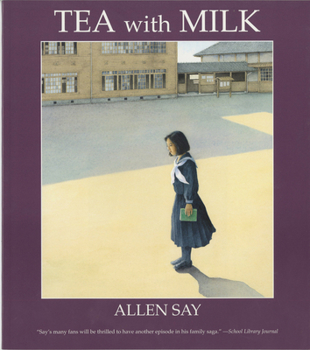Tea with Milk
Select Format
Select Condition 
Book Overview
At home in San Francisco, May speaks Japanese and the family eats rice and miso soup and drinks green tea. When she visits her friends' homes, she eats fried chicken and spaghetti. May plans someday to go to college and live in an apartment of her own. But when her family moves back to Japan, she soon feels lost and homesick for America. In Japan everyone calls her by her Japanese name, Masako. She has to wear kimonos and sit on the floor. Poor May...
Format:Paperback
Language:English
ISBN:0547237472
ISBN13:9780547237473
Release Date:May 2009
Publisher:Houghton Mifflin
Length:32 Pages
Weight:0.40 lbs.
Dimensions:0.2" x 9.2" x 10.5"
Age Range:4 to 7 years
Grade Range:Preschool to Grade 2
Customer Reviews
5 ratings
Touched by a woman's strong will to be herself
Published by Thriftbooks.com User , 19 years ago
Masako, or May, is a very strong-minded person to be able to stand up for herself in her own native country, which seems so distant to her. Though May is forced to move back to Japan, she continues to long for returning back to America, where she belongs. As she is determined to remain an American girl, she is recalled as a foreigner to others. I could not help being intrigued by Allen Say's descriptions of his mother's determination and of course the beautiful artwork portrayed in the book. So well does the potraits go with the story that all of the emotion and settings come to life. But I do feel that May should have gotten to know the Japanese culture better, and not had had the moving incident affect the way she looks at Japan.
Beautiful and Inspiring by Faisa M.
Published by Thriftbooks.com User , 19 years ago
I think this book was an excellent book. It showed the struggle of a little girl that was born in the States but moved back to her homeland in Japan. The girl grew up to be a revolutionary and showed that women have a place in the working world. Masako a.k.a. May showed that she was an independant woman and she wanted to leave her mark in this world.May is a real role model and I hope children all around the world have the chance to read this book and grow up to be like her.
Wonderfully illustrated!!
Published by Thriftbooks.com User , 23 years ago
I just read this book for the first time today and I was blown away by the illustrations. The story is not only touching and very thought-provoking, as well as true, but the illustration bring to the story a totally fresh and realistic view. Mr. Say is both a talented author and illustrator. I was so captivated by the realism in the drawings and the detail that is paid to the face of the main character, who you come to find out is in some way related to him (I don't want to spoil the whole story, even if it is just a children's book). By far this book is a great read and an excellent buy!
Caught between cultures
Published by Thriftbooks.com User , 24 years ago
An important theme in Tea With Milk is the fact that as people move between two cultures they often do not feel completely comfortable in either one. May's parents return to Japan because they are homesick. I would guess that they are not as Japanese as they would have been had they not lived in the U. S. Their pushing May to be so traditional could be the result of their attempt to reassimilate. May, of course, experiences most deeply the pain of immigration, and even Joseph, Say's father, is adopted, raised in Shanghai, and working in Japan. Joseph, in fact, best expresses the characters' dilemmas when he says that "home isn't a place or a building that's ready-made and waiting for you, in America or anywhere else". May and Joseph then decide to make a home for themselves and adopt Japan by choice. I found this book more positive and optimistic than Grandfather's Journey where Say's grandfather never seems to reconcile himself to living in either the U.S or Japan and remains saddened, caught between the cultures. Even the title Tea With Milk demonstrates some assimilation on the part of the parents. In a country that drinks tea plain, they drink it in the style of western countries and Allen Say states at the end of the book that that is the way he prefers his tea too. Hopefully, he has found some comfort in defining what he likes from both cultures as well.
culture differences, U.S. and Japan
Published by Thriftbooks.com User , 24 years ago
Masako's struggle to be a "lady" in Japan after growing up with more freedom in the U.S. is one of the main themes of this book. Although most of the story takes place after Masako has graduated from high school, the events are explained clearly, and are interesting to both children and adults. The last page reminds the reader that Masako is not a fictional character but in fact the author's mother.






